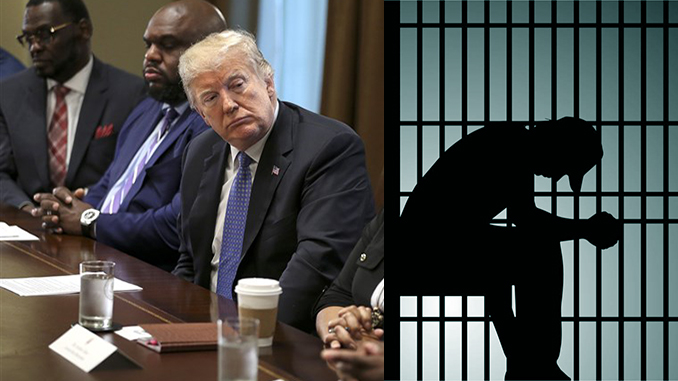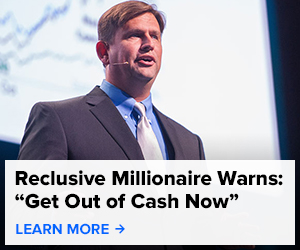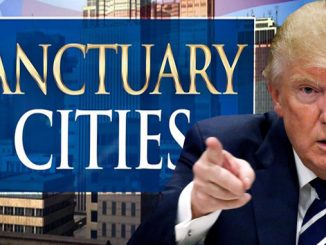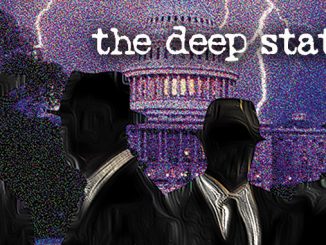
Strange bedfellows, perhaps, but President Trump and a bipartisan group of black Christian ministers have been meeting to discuss prison reform. S.T. Patrick explains that “most conservative Republicans and the most liberal Democrats have long seen incarceration as one of this country’s gravest ills.”
By S.T. Patrick
No issue seems to have made stranger bedfellows of perceived opponents than the challenge of prison reform. In recent months, groups of black pastors have both visited the White House and stayed in close contact with the Trump administration, urging a partnership on an issue that has long devastated the black community.
RELATED: Listen to S. T. Patrick’s March 2nd interview at Midnight Writer News with Mohamed Shehk of CriticalResistance.org about the Prison Abolition Movement.
CNN’s Don Lemon criticized the group of black pastors for meeting with President Donald Trump, going as far as to tell Pastor John Gray that he was being used as a “prop.” What some casual observers may not realize, however, is that the most conservative Republicans and the most liberal Democrats have long seen incarceration as one of this country’s gravest ills.
The modern conservative most closely associated with prison reform was also President Richard Nixon’s “dirty tricks artist,” Charles Colson. He had once boasted that he would “walk over (his) own grandmother” to ensure the reelection of Nixon in 1972. Self-described as Nixon’s “hatchet man,” Colson compiled the “enemies list” of Nixon detractors and was instrumental in orchestrating the illegal actions aimed to discredit whistleblower Daniel Ellsberg, who had released the Pentagon Papers to The New York Times and other newspapers. It was for the Ellsberg activities and not Watergate that Colson would be sent to prison for obstruction of justice in 1974, a sentence he would serve at the federal Maxwell Prison in Alabama.
While going through the legal turmoil that followed Nixon officials out of the beltway, Colson, in August 1973, experienced a religious transformation that would change the rest of his life. Though his attorneys advised him not to do so, Colson pled guilty, a decision he later said was “a price I had to pay to complete the shedding of my old life and to be free to live the new.”
Paroled in 1975, Colson entered into the evangelical movement that was rising throughout the 1970s and forged a new career based upon prison reform. The man who had described himself as Nixon’s “loose cannon” sold millions of copies of his 1976 autobiography Born Again. Though the mainstream media was typically skeptical of Colson’s conversion, 1976 also brought the formation of Colson’s Prison Fellowship Ministries, which has now opened offices in over 100 countries.
The American Left has long pushed for prison reform, a movement highlighted by the 1968 scandal at Tucker Prison Farm in Arkansas, where investigators discovered a lack of food, 14-hour workdays, systematic rape and the torture of inmates by both guards and inmate “trustees.” It was in January 1968, 50 years ago, that a native Arkansan, Johnny Cash, performed two concerts at Folsom State Prison, thus musically highlighting the need for reform.
Today, the U.S. has 5% of the world’s population and 25% of the world’s prison population. Lack of treatment as a first step to dealing with drug addiction is a problem that increases incarceration numbers, but so is the over-legislation of American society. According to the Institute for Policy Studies citing John Whitehead, Congress has created an average of 50 new federal crimes per year over the last decade. That means that 500 acts that were legal in 2008 are now illegal and punishable by prison time.
White evangelicals are now on board with prison reform, as well. In May, ministers from across the country met with President Trump to push for a new First Step Act that would allow better conditions for pregnant inmates and would encourage paths to early release for prisoners who earn points for good behavior.
“America is a nation that believes in the power of redemption,” Trump told the audience of ministers.
Whether that belief can transform into action that will give relief to families burdened by the economic and sociological realities of incarceration is the test that analysts believe the Senate may fail. The Senate is populated by stalwarts of their own party’s political machines. They are moderate, by nature, when compared to their more accountable colleagues in the House. Yet, if a popular swell can arise, a movement that rediscovers the belief and hope that America once had in each individual, bipartisan change can occur.
S.T. Patrick holds degrees in both journalism and social studies education. He spent 10 years as an educator and now hosts the “Midnight Writer News Show.” His email is [email protected].





